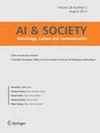Artificial intelligence national strategy in a developing country
IF 2.9
Q2 COMPUTER SCIENCE, ARTIFICIAL INTELLIGENCE
引用次数: 0
Abstract
Abstract Artificial intelligence (AI) national strategies provide countries with a framework for the development and implementation of AI technologies. Sixty countries worldwide published their AI national strategies. The majority of these countries with more than 70% are developed countries. The approach of AI national strategies differentiates between developed and developing countries in several aspects including scientific research, education, talent development, and ethics. This paper examined AI readiness assessment in a developing country (Palestine) to help develop and identify the main pillars of the AI national strategy. AI readiness assessment was applied across education, entrepreneurship, government, and research and development sectors in Palestine (case of a developing country). In addition, it examined the legal framework and whether it is coping with trending technologies. The results revealed that Palestinians have low awareness of AI. Moreover, AI is barely used across several sectors and the legal framework is not coping with trending technologies. The results helped develop and identify the following five main pillars that Palestine’s AI national strategy should focus on: AI for Government, AI for Development, AI for Capacity Building in the private, public and technical and governmental sectors, AI and Legal Framework, and international Activities.发展中国家的人工智能国家战略
人工智能(AI)国家战略为各国提供了开发和实施人工智能技术的框架。全球60个国家发布了人工智能国家战略。这些国家以发达国家居多,占比超过70%。人工智能国家战略的方法在科学研究、教育、人才发展和道德等几个方面区分了发达国家和发展中国家。本文研究了一个发展中国家(巴勒斯坦)的人工智能准备情况评估,以帮助制定和确定人工智能国家战略的主要支柱。人工智能准备情况评估应用于巴勒斯坦的教育、创业、政府和研发部门(以发展中国家为例)。此外,它还审查了法律框架以及它是否正在应对趋势技术。结果显示,巴勒斯坦人对人工智能的认知度较低。此外,人工智能几乎没有在几个领域得到应用,法律框架也无法应对趋势技术。研究结果有助于制定和确定巴勒斯坦人工智能国家战略应重点关注的以下五个主要支柱:人工智能政府、人工智能发展、人工智能私营、公共、技术和政府部门的能力建设、人工智能和法律框架以及国际活动。
本文章由计算机程序翻译,如有差异,请以英文原文为准。
求助全文
约1分钟内获得全文
求助全文
来源期刊

AI & Society
COMPUTER SCIENCE, ARTIFICIAL INTELLIGENCE-
CiteScore
8.00
自引率
20.00%
发文量
257
期刊介绍:
AI & Society: Knowledge, Culture and Communication, is an International Journal publishing refereed scholarly articles, position papers, debates, short communications, and reviews of books and other publications. Established in 1987, the Journal focuses on societal issues including the design, use, management, and policy of information, communications and new media technologies, with a particular emphasis on cultural, social, cognitive, economic, ethical, and philosophical implications.
AI & Society has a broad scope and is strongly interdisciplinary. We welcome contributions and participation from researchers and practitioners in a variety of fields including information technologies, humanities, social sciences, arts and sciences. This includes broader societal and cultural impacts, for example on governance, security, sustainability, identity, inclusion, working life, corporate and community welfare, and well-being of people. Co-authored articles from diverse disciplines are encouraged.
AI & Society seeks to promote an understanding of the potential, transformative impacts and critical consequences of pervasive technology for societies. Technological innovations, including new sciences such as biotech, nanotech and neuroscience, offer a great potential for societies, but also pose existential risk. Rooted in the human-centred tradition of science and technology, the Journal acts as a catalyst, promoter and facilitator of engagement with diversity of voices and over-the-horizon issues of arts, science, technology and society.
AI & Society expects that, in keeping with the ethos of the journal, submissions should provide a substantial and explicit argument on the societal dimension of research, particularly the benefits, impacts and implications for society. This may include factors such as trust, biases, privacy, reliability, responsibility, and competence of AI systems. Such arguments should be validated by critical comment on current research in this area. Curmudgeon Corner will retain its opinionated ethos.
The journal is in three parts: a) full length scholarly articles; b) strategic ideas, critical reviews and reflections; c) Student Forum is for emerging researchers and new voices to communicate their ongoing research to the wider academic community, mentored by the Journal Advisory Board; Book Reviews and News; Curmudgeon Corner for the opinionated.
Papers in the Original Section may include original papers, which are underpinned by theoretical, methodological, conceptual or philosophical foundations. The Open Forum Section may include strategic ideas, critical reviews and potential implications for society of current research. Network Research Section papers make substantial contributions to theoretical and methodological foundations within societal domains. These will be multi-authored papers that include a summary of the contribution of each author to the paper. Original, Open Forum and Network papers are peer reviewed. The Student Forum Section may include theoretical, methodological, and application orientations of ongoing research including case studies, as well as, contextual action research experiences. Papers in this section are normally single-authored and are also formally reviewed. Curmudgeon Corner is a short opinionated column on trends in technology, arts, science and society, commenting emphatically on issues of concern to the research community and wider society. Normal word length: Original and Network Articles 10k, Open Forum 8k, Student Forum 6k, Curmudgeon 1k. The exception to the co-author limit of Original and Open Forum (4), Network (10), Student (3) and Curmudgeon (2) articles will be considered for their special contributions.
Please do not send your submissions by email but use the "Submit manuscript" button.
NOTE TO AUTHORS: The Journal expects its authors to include, in their submissions:
a) An acknowledgement of the pre-accept/pre-publication versions of their manuscripts on non-commercial and academic sites.
b) Images: obtain permissions from the copyright holder/original sources.
c) Formal permission from their ethics committees when conducting studies with people.
 求助内容:
求助内容: 应助结果提醒方式:
应助结果提醒方式:


